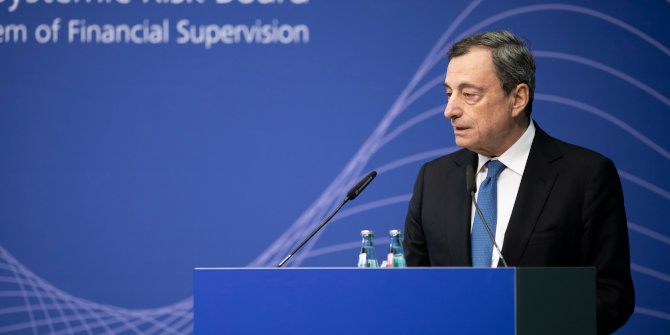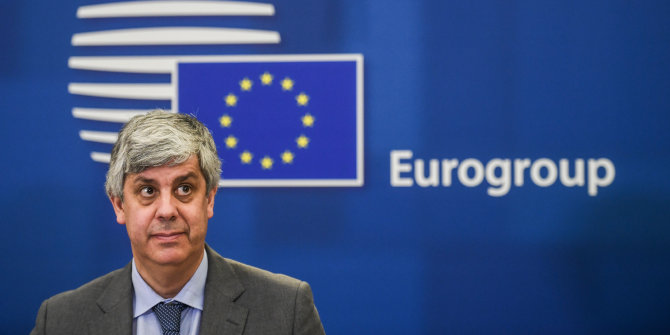 The European Commission published a reflection paper at the end of May on deepening economic and monetary union. Iain Begg assesses the strategy for reform put forward, writing that the paper is relatively guarded and does not convey an explicit trajectory for the next stages of development of EMU governance. He argues that unless and until there is a greater sense of urgency when it comes to pursuing reforms, the Eurozone will remain vulnerable and could easily drift into a fresh crisis which it is still ill-equipped to resolve.
The European Commission published a reflection paper at the end of May on deepening economic and monetary union. Iain Begg assesses the strategy for reform put forward, writing that the paper is relatively guarded and does not convey an explicit trajectory for the next stages of development of EMU governance. He argues that unless and until there is a greater sense of urgency when it comes to pursuing reforms, the Eurozone will remain vulnerable and could easily drift into a fresh crisis which it is still ill-equipped to resolve.
Image credit: Twitter/Valdis Dombrovskis
Earlier this year, the European Commission published a consultative White Paper setting out a number of scenarios on the Future of Europe and undertook to nourish the ensuing debates by releasing a series of Reflection Papers on key dimensions of the development of the Union. Among these is the recently-released one on the deepening of economic and monetary union (EMU). It follows high profile reports on establishing a ‘genuine economic and monetary union’ (2012) and on ‘completing economic and monetary union’ (2015), usually referred to, respectively, as the Four Presidents’ and Five Presidents’ reports.
The new paper emphasises the continuing broad support for the euro and quotes an interesting statistic, claiming “euro area governments have saved EUR 50 billion in interest payments annually compared to a few years ago”. Ironically, this windfall is partly to blame for some of the problems the Eurozone has endured, because it arguably allowed some governments to put off reforms needed to adapt to the economic requirements of a single currency. Notwithstanding some rather breathlessly optimistic passages about the recovery of the Eurozone taking hold, there is plenty of astute analysis of what needs to be corrected, as well as of the economic and social consequences of failing to act.
Reform of the governance of the Eurozone has been one of the main priorities of the EU institutions following the succession of crises after 2007. As the paper points out, much has already been done to bolster economic governance, but it also highlights both remaining gaps and shortcomings in some of the existing mechanisms. Even so, the paper asserts that the “architecture of the euro area is as robust as it has ever been”, but goes on to warn “there should be no complacency”. Measures already enacted have sought to strengthen fiscal discipline, to prevent destabilising macroeconomic imbalances and to create new funds to alleviate pressures on governments under pressure from financial markets. The role of the European Central Bank has been enhanced, not least in relation to banking union, the dimension of a fuller EMU to have made most progress in the last five years.
But there are also continuing disagreements about what further steps to take and with what ultimate aims – whether labelled ‘genuine’, ‘completing’ or ‘deepening’ – to enable EMU to function optimally. These disagreements turn, above all, on the willingness of participants in the euro to countenance the rapid introduction of mechanisms for risk-sharing, such as common deposit insurance (part of banking union still in abeyance) or even the much maligned €urobonds, and on the sequencing of changes.
One view, typically associated with Germany and other creditor countries, is that risk must first be substantially reduced by effective application of rules and other agreed instruments for constraining national policy-makers to pursue sound macroeconomic policies. The other – which can be ascribed to France, Italy and other southern member states – is that risks need urgently to be shared to confer more room for manoeuvre on euro area members trapped into low growth trajectories. Without such risk-sharing, they will struggle to resolve their economic challenges and could aggravate divergence in macroeconomic performance, complicating euro area policy-making.
What is most intriguing to note in the reflection paper is the further scaling-back of the ambitions set for Eurozone governance. In the Four Presidents’ report and the parallel proposals by the European Commission, published in 2012, advocacy of fiscal union was prominent and much closer coordination among member states was envisaged. There were explicit plans, together with a relatively tight timetable, for common debt instruments and an additional fiscal capacity to enhance the scope for fiscal stabilisation. In setting out three phases for action, the Commission blueprint even called for the “creation of a proper fiscal capacity for the EMU” in eighteen months to five years from 2012 – meaning by now – and envisaged the longer term creation of an EMU budget with the right to borrow. Common deposit insurance was considered a key part of banking union and the report explicitly mentioned the European Stability Mechanism (ESM – the permanent fund established in 2012 to take over the temporary funds set-up to provide bailouts to countries under fiscal stress) serving as a financial backstop for both common deposit insurance and bank resolution. The language included phrases such as “pooling of risk” alongside “pooling of decisions on budget”.
By the Five Presidents’ report, published in 2015, some of the more far-reaching, but also contentious, proposals associated with fiscal union had quietly been dropped, although there was still an emphasis on a fiscal stabilisation capacity. Some relatively low key proposals from the five presidents envisaged for a first phase of reform have since been implemented. They include the establishment of a new, though only advisory, European Fiscal Board charged with oversight of fiscal policy. It is expected, in particular, to monitor compliance with common fiscal rules and to foster coordination of fiscal policies. There was also agreement on creating new Competitiveness Boards.
But the more weighty reforms were to have been set out, as stated in the report, “in a White Paper in spring 2017 assessing progress made in Stage 1 and outlining the next steps needed, including measures of a legal nature to complete EMU in Stage 2”. There was, indeed, a White Paper from the Commission, but it is not on how to complete EMU and neither it, nor the new reflection paper, identifies a schedule for specific measures. The implication is that some of the tough choices about how to recast EMU are again being avoided. To revive a metaphor much used in the early months of the euro crisis, the can is again being kicked down the road.
Yet there are signs of new thinking. Asserting that EMU is “not an end in itself”, the reflection paper identifies jobs, growth, fairness and stability as core goals, while also calling for a balance between responsibility and solidarity. The latter two aims represent an attempt to reconcile the fundamental cleavage between those favouring risk reduction and those concerned to achieve risk sharing. It also emphasises the mismatch between the strong fiscal rules in place and the softness of the coordination process of the ‘European Semester’. A related concern is the mixed nature of the institutional architecture, combining some supranational and what are called “an increasing number of intergovernmental bodies and practices”. The paper argues that this mix undermines trust both among Member States and between them and the EU institutions, while also rendering decision-making overly complex. It also detracts from the scope for pursuing policies in the collective interest of the euro area.
On what to do about fiscal rules, the paper is surprisingly anodyne. Noting the divisions between those who regard them as too lax or too demanding, the paper finds that “everybody agrees, however, that they have become excessively complex, which hinders ownership and effective implementation”. But it merely suggests that once economic interdependence is better managed and there is stronger market discipline, simpler rules might be feasible. This is somewhat disingenuous because, as argued in a recent paper, there is not just unease about how rules are configured, but growing doubts about the credibility of implementation in rules-based governance.
On institutional development, the paper briefly discusses a number of options without offering any firm recommendations. They include a Euro Treasury which might be a champion for the collective euro area, and might also undertake some of the surveillance functions from other bodies to overcome the scatter of competences and functions. An even more tentative option, accorded just one sentence, is for there to be a euro area finance minister, charged with responsibility for such a Treasury. What is conspicuously not discussed is said Treasury issuing a common bond.
The paper also canvasses a European Monetary Fund (EMF), maybe evolving from the ESM and having a more hands-on role in devising and implementing macroeconomic adjustment programmes. Perhaps as a barb aimed at the IMF, given the tensions around the latest Greek adjustment programme, a rationale mentioned is “to give the euro area more autonomy from other international institutions, when it comes to financial stability”. Yet another very hesitant suggestion at the end of the passage on the EMF is that it might possibly be assigned a role as a backstop of the banking union.
Compared with the Five Presidents’ report and, even more so, the Four Presidents’ report, the reflection paper is guarded and, while mentioning many options and when they might occur, does not convey an explicit trajectory for the next stages of development of EMU governance. Faced with the difficulty of reconciling different national views, this may be all that is feasible. But in the meantime, the tensions emanating from a sub-optimal EMU have not gone away and cannot be masked by the moderate recovery of growth and jobs across much of the euro area. A final paragraph starts with a rather plaintive assertion: “it is time to put pragmatism before dogma, to put bridge-building before individual mistrust”.
Nevertheless, the politics of reform are changing. The strong mandate achieved by Emmanuel Macron will bring to the table a powerful advocate of a move towards a fiscal union going well beyond rules. At the EU level, too, the shortcomings in rules and the need for more than a disciplinarian approach towards economic governance are increasingly being recognised. But unless and until there is a greater sense of urgency, the Eurozone will remain vulnerable and could easily drift into a fresh crisis which it is still ill-equipped to resolve. As a minimum, what is needed is to complete banking union, to develop policy instruments better able to stabilise the economy of the Eurozone as a whole, and to tilt the balance more towards risk-sharing by moving towards debt mutualisation. As has been repeated endlessly, “we all know what to do…”
It is time to act, not just to reflect.
Please read our comments policy before commenting.
Note: This article gives the views of the author, and not the position of EUROPP – European Politics and Policy, nor of the London School of Economics.
_________________________________
 Iain Begg – LSE
Iain Begg – LSE
Iain Begg is a Professorial Research Fellow at the European Institute, London School of Economics and Political Science, Senior Fellow on the UK Economic and Social Research Council’s initiative on The UK in a Changing Europe, and a participant in the ‘Firstrun‘ project funded under the EU’s Horizon 2020 programme.






